Best Protein Sources for Blood Sugar Stability - You'll want to know this!

Did you know that excess proteins can’t be stored in the body so the body will convert excess proteins to glucose which will trigger a release of insulin?
This process is called gluconeogenesis. It is a demand driven process and I see it occur very frequently in my clients with Reactive Hypoglycemia because they are sugar burners (and lack metabolic flexibility), thus the demand for glucose is often higher.
Additionally, protein causes a mild an insulin response so without the fat, this affect is more pronounced. Add carbs to the mix and you’re looking at a significant blood sugar and big insulin spike (which may come with an inevitable crash for my RH friends)
This is why the recommendations on a keto diet are for fatty, not lean protein.
When we eat proteins that come with fat, this helps to slow the absorption of the glucose and blunt blood sugar spikes, thereby reducing the chance of a blood sugar crash.
Fats have virtually no effect on blood sugar & insulin and keep you satia...
There are better sources of probiotics
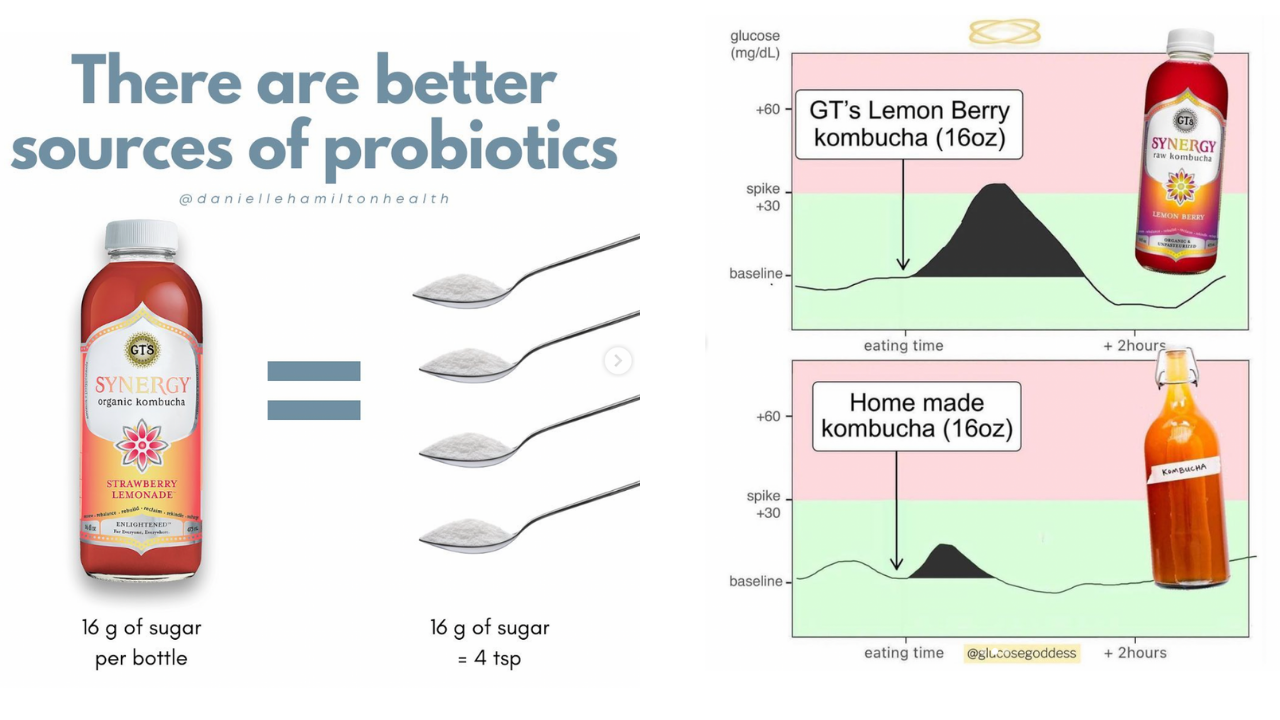
I posted this graphic ages ago and I got a lot of heat because people were upset to hear this information.
When I saw @glucosegoddess’ CGM graph of the kombucha, it confirmed what I had been saying all along so I wanted to share this again.
Store bought kombucha has a ton of sugar because most of them add fruit juices after fermentation.
I remember when GTs kombucha used to only have 1tsp of sugar per bottle and now I can’t find any with fewer than 4 tsp per bottle!
Thanks to @glucosegoddess for subjecting your body to such a sugar bomb to get this very eye-opening glucose graph.
Not only did her sugar spike more than 30 mg/dL after drinking the kombucha (which is inflammatory), it also caused a big spike of insulin which lowered the glucose below baseline, putting her in what I call, “The Craving Zone”.
When the blood sugar is going down like in that graph, a person might experience cravings, anxiety, irritability, headaches, hunger, brain fog, nausea, shakiness, dizziness and more.
Pro tips...
You shouldn’t have to eat every few hours to keep your blood sugar from crashing!

You shouldn’t have to eat every few hours to keep your blood sugar from crashing!
If you do, you are likely stuck in a sugar-burning mode where your body cannot efficiently burn fat for fuel.
When you can’t burn fat for fuel, you’re chained to sugar and carbs. Since sugar and carbs spike insulin, the insulin ends up storing the sugar leaving you once again with low blood sugar and a need for more sugar and carbs!
This is the blood sugar roller coaster. It is often due to insulin resistance, and a combination of low adrenal function and mineral deficiency.
Diet-wise, I constantly hear people talking about “eating more protein” if your blood sugar always crashes.
Yes, protein is important but what’s being left out of the conversation is FAT!!! You need fat to stabilize your blood sugar.
Too much protein, especially lean protein, converts to sugar so if your blood sugar is always crashing and you’re eating a chicken breast and vegetables, you’re not fueling properly.
If you are struggling with b...
Hypoglycemic Symptoms Can Be Felt at Any Blood Sugar Number
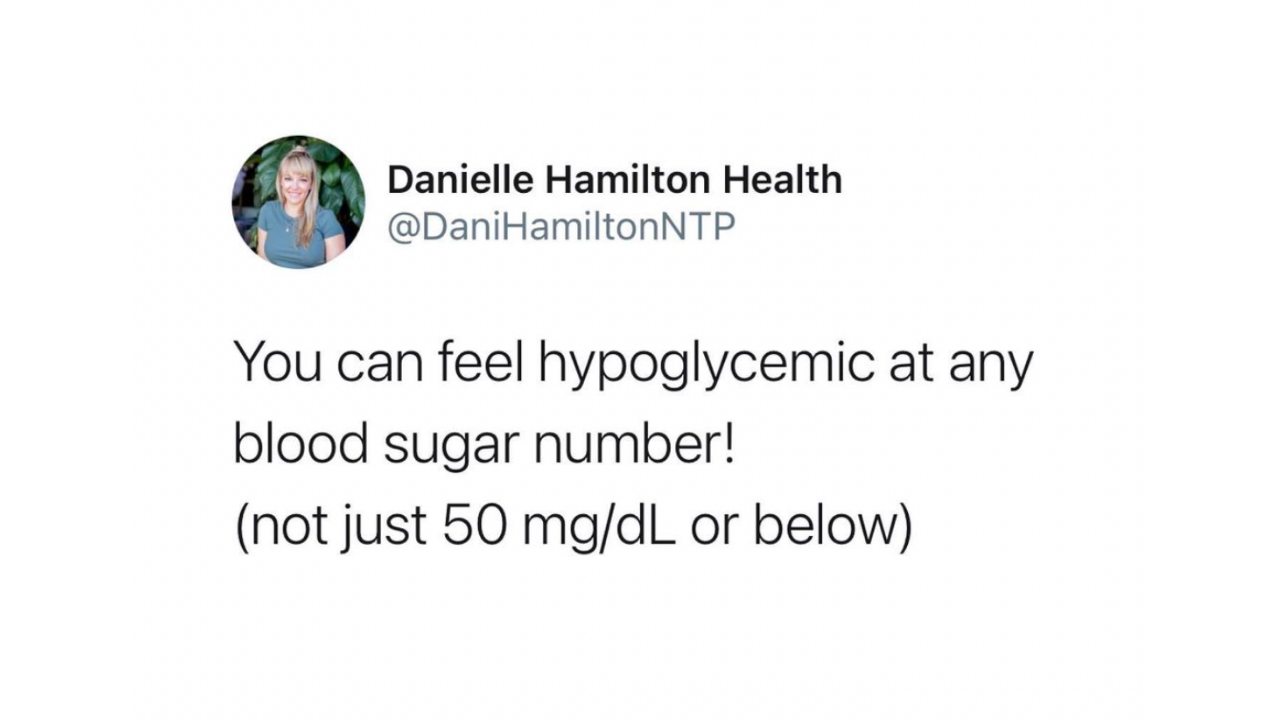
The gaslighting from doctors needs to stop! Hypoglycemic symptoms can be felt at any blood sugar number.
What are symptoms of hypoglycemia?
•Dizziness / weakness / shakiness
•Brain fog / difficulty concentrating
•Intense or urgent hunger / cravings for carbs, sweets, starches
•Anxiety / irritability / moodiness
•Racing heart / heart palpitations
•Fatigue
•Tingling or dry lips
•Headaches
•Sweating
•Nausea / vomiting
These symptoms are indicating your body perceives you are low on fuel.
This is often due to an inability to efficiently burn body fat for fuel.
Has Your Doctor of Nutritionist Told You to Eat Carbs Every 2-3 Hours to "Stabilize Your Blood Sugar?"
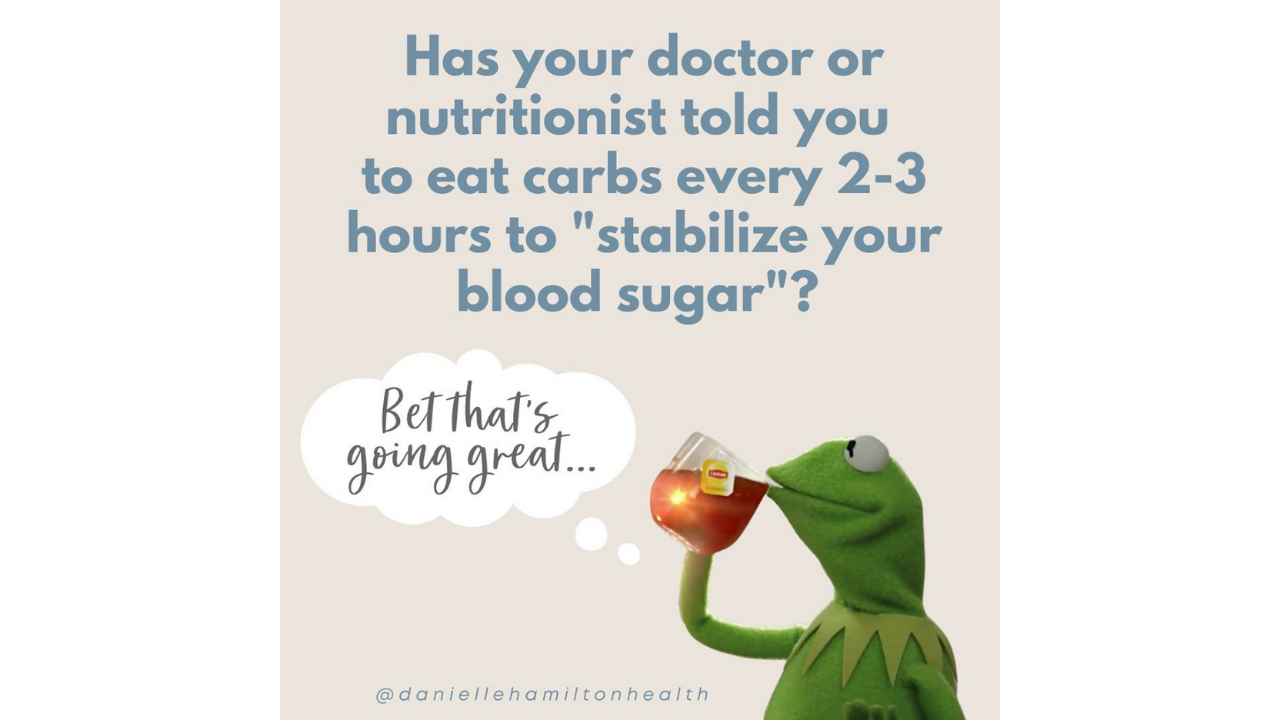
Sure eating will bring your blood sugar up if you’re having a low, but chances are you’re eating carbs or sugar to bring it back up which is actually worsening the root cause of the issue.
So the “treatment” is actually making you worse.
I get reports from clients all the time that this method only makes them crash more often!! It’s a nightmare.
If you suffer with hypoglycemia or reactive hypoglycemia, or constant blood sugar crashes, you feel like you’re on a blood sugar roller coaster that you can’t get off of.
It interferes with your life, your well-being, impacts your relationships, your job, perhaps you can’t drive or work anymore.. but this doesn’t have to be how it is.
There is HOPE that this can be reversed! And the answer is not eat more carbs more often.
To learn more, click the link below to purchase the Reactive Hypoglycemia Masterclass:
Best Proteins for Blood Sugar Stability

Excess proteins can’t be stored in the body so the body will convert excess proteins to glucose which will trigger a release of insulin.
The conversion of protein to glucose occurs as a result of the hormone, glucagon.
This process is called gluconeogenesis.
This is why the recommendations on a keto diet are for fatty, not lean protein.
When we eat proteins that come with fat, this helps to slow the absorption of the glucose and blunt blood sugar spikes.
Fats have virtually no effect on blood sugar & insulin and keep you satiated and energized for hours. Fats are like logs on the fire.
In my clients with hypoglycemia and Reactive Hypoglycemia, they are especially sensitive to and prone to gluconeogenesis which in them leads to blood sugar crashes.
The Earliest Signs of Blood Sugar Issues

If you miss a meal and experience these symptoms, or if you have to snack before the next meal because of these, chances are you’re experiencing some blood sugar dysregulation.
Our bodies were designed to go long periods without food because they’re supposed to be able to just burn stored fuel (glycogen and then body fat) when food is not around.
Our high carb diets, consumption of processed foods, constant snacking, damaged fat consumption (vegetable oils), messed up guts, and tired adrenals can all contribute to the development of these blood sugar issues.
Does this sound like you??
Swap This For This...
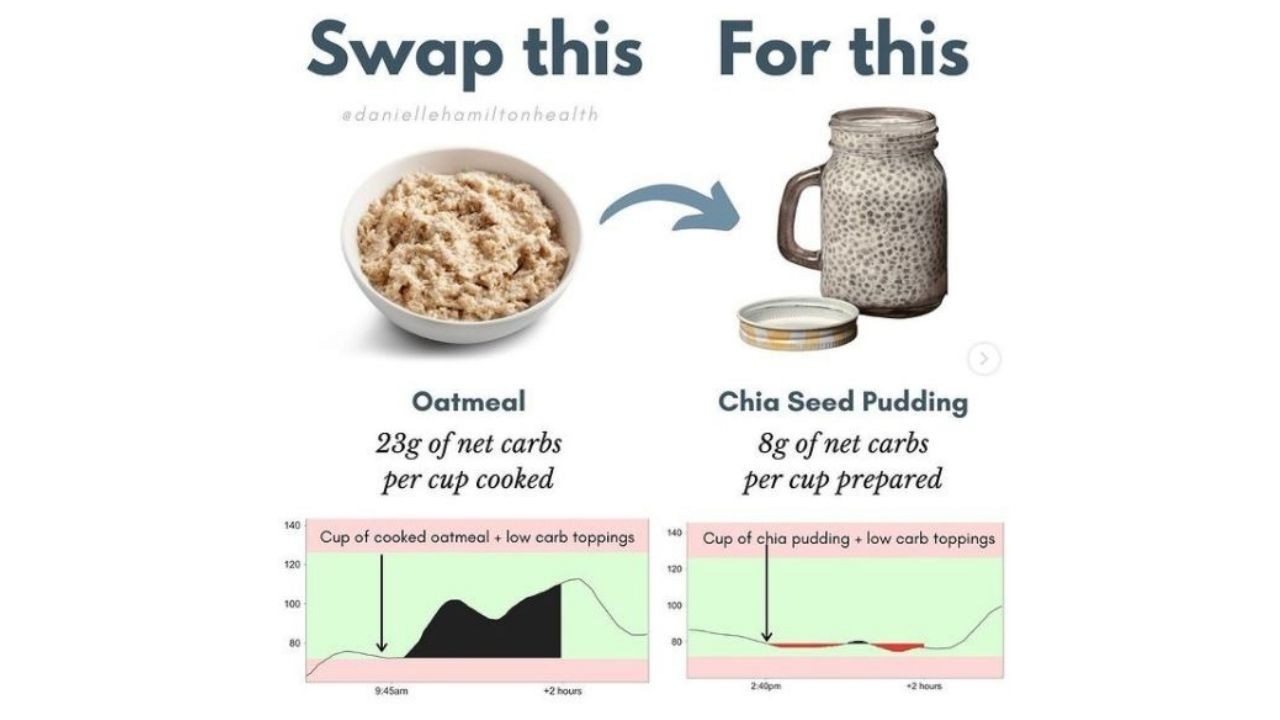
It’s time to break up with your morning oatmeal!! Even though it’s a “complex carb” it still raises the blood sugar for HOURS!!
We want to avoid spiking the blood sugar in this way because it’s inflammatory and raises insulin levels. This can lead to excess hunger, cravings, headaches and lots of other symptoms of blood sugar dysregulation.
In the graph on the left, I had oatmeal with cashew butter, full fat Greek yogurt, coconut, bee pollen and raspberries. All of those toppings are low carb and some contain healthy fats.
The presence of those fats was not enough to prevent a spike.
With the chia seed pudding on the other hand, I still had some fat-filled or low carb toppings like raw cacao, pecans, cacao nibs and a few wild blueberries.
The difference is very clear: absolutely NO spike in my blood sugar at all from the chia seed pudding!!
Important notes: neither chia seed pudding nor oatmeal contains a sufficient amount of protein to be a complete, satiating, nourishing meal.
I am not a fa...
Hypoglycemia Can Be Caused By...
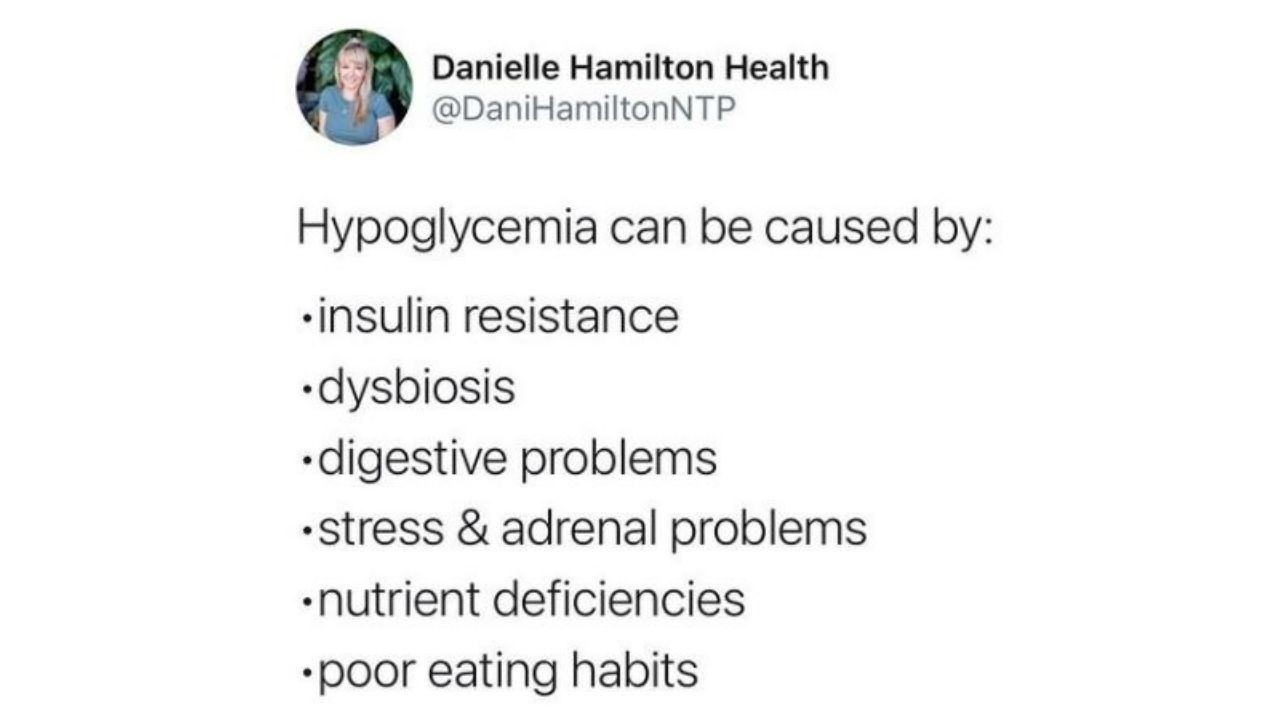
Hypoglycemia is tricky to treat! The “poor eating habits” such as consuming vegetable oils, processed carbs and snacking is the low hanging fruit. They need to be removed from the diet (though the person may still need to eat more frequently at first).
But what people often miss is how much the gut, adrenals and nutrient deficiencies play a role!
Once again, diet is only a piece of the puzzle (albeit a very large piece) but we always need to look “under the hood” at how the body is functioning.
I hope if you’re struggling this gives you hope because there are more areas to explore!!
The Key to Stable Energy, Fat Burning & Metabolic Health is: Glycemic Control

What the heck is “balanced blood sugar” anyway?? It’s another way of saying GLYCEMIC CONTROL.
When we have good glycemic control, our blood glucose stays very stable in a tightly controlled range. There are no steep increases or sudden crashes. As you can see from these graphs, good glycemic control stays within that optimal green range.
On the other hand, poor glycemic control looks like the chart on the right. There are steep inclines and abrupt crashes in the blood glucose.
Why does that matter? Because those spikes and crashes will make you feel like shit!
everyone experiences blood sugar issues differently but here are some things you might feel:
•fatigue or energy crashes
•cravings, intense & urgent hunger
•shakiness, dizziness, lightheadedness
•anxiety, irritability or other mood issues
•brain fog or inability to concentrate
•poor sleep (notice the red crash in the early morning - that person probably woke up with a pounding heart!)
•headaches or migraines
•nausea, sweats
Overtime poor glyce...

